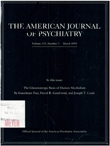Deficits in short-term memory in posttraumatic stress disorder
Abstract
OBJECTIVE: The purpose of this study was to compare the memory function of patients with posttraumatic stress disorder (PTSD) to that of matched comparison subjects. METHOD: Vietnam veterans with combat- related PTSD (N = 26) were compared to physically healthy comparison subjects (N = 15) matched for age, race, sex, years of education, handedness, socioeconomic status, and alcohol abuse. Memory and intelligence were assessed with a battery of neuropsychological tests, including the Russell revision of the Wechsler Memory Scale, the Selective Reminding Test, and subtests of the Wechsler Adult Intelligence Scale-Revised (WAIS-R). RESULTS: The PTSD patients scored significantly lower than the comparison subjects on the Wechsler Memory Scale logical memory measures for immediate recall (mean = 11.6, SD = 3.3 versus mean = 20.9, SD = 6.6) and delayed recall (mean = 8.0, SD = 3.3 versus mean = 17.8, SD = 6.4). The PTSD patients also scored significantly lower on the total recall, long-term storage, long-term retrieval, and delayed recall measures for the verbal component of the Selective Reminding Test and on the recall, long-term storage, long- term retrieval, and continuous long-term retrieval measures for the visual component of the Selective Reminding Test. There was no significant difference between the PTSD patients and comparison subjects in prorated full-scale IQ as measured by the WAIS-R. CONCLUSIONS: Patients with PTSD may have deficits in short-term memory. Counseling and rehabilitation that address these deficits may be of value for PTSD patients.
Access content
To read the fulltext, please use one of the options below to sign in or purchase access.- Personal login
- Institutional Login
- Sign in via OpenAthens
- Register for access
-
Please login/register if you wish to pair your device and check access availability.
Not a subscriber?
PsychiatryOnline subscription options offer access to the DSM-5 library, books, journals, CME, and patient resources. This all-in-one virtual library provides psychiatrists and mental health professionals with key resources for diagnosis, treatment, research, and professional development.
Need more help? PsychiatryOnline Customer Service may be reached by emailing [email protected] or by calling 800-368-5777 (in the U.S.) or 703-907-7322 (outside the U.S.).



